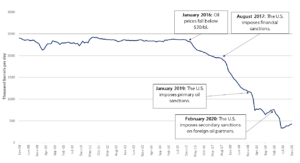January 18, 2023
En español| Sanctions Fact Sheet ![]()
On December 5, 2022, the International Monetary Fund’s (IMF) Western Hemisphere Department published a report titled “Regional Spillovers from the Venezuelan Crisis,” which assesses the causes of Venezuela’s economic crisis, the drivers of the country’s record emigration, and the impact that this influx of Venezuelan migrants has had on neighboring countries. While these are worthy topics of research, and there is much of value in the report, authors Alvarez et al. curiously omit a critical piece of the puzzle, and one of the single most important factors contributing to Venezuela’s current economic and humanitarian plight: US economic sanctions.
In August 2017, the Trump administration issued Executive Order 13808, barring the government of Venezuela, including the state-owned oil company Petróleos de Venezuela, S.A. (PDVSA) and its joint ventures, from accessing US financial markets. Though the United States had imposed sanctions on certain Venezuelan individuals and entities before this, including under the Obama administration’s E.O. 13692, which declared a US national emergency with respect to Venezuela, the August 2017 sanctions marked the beginning of a series of sweeping sanctions that would define the Trump administration’s approach to US-Venezuelan relations. Sanctions were escalated even further alongside the recognition of a parallel government beginning in 2019, most notably with the January 28 designation of PDVSA as a sanctioned entity, and the 2020 imposition of secondary sanctions against shipping companies involved in the transportation of Venezuelan oil. The vast majority of these sanctions remain in place today.
The impact of these sanctions has been swift and disastrous, particularly on Venezuela’s oil output, which is the country’s primary source of foreign revenue. While there are no doubt multiple factors that have contributed to Venezuela’s precipitous drop in oil production — from 2.4 million barrels per day (bpd) prior to the crisis, to a low of 0.4 million bpd in mid-2020 — a preponderance of evidence points to US sanctions as a significant driver of the decline. A 2022 analysis by one of the authors of this post, Francisco Rodríguez, attributes the loss of 797,000 bpd to the 2017 financial sanctions. Other studies using different methodologies have set this figure at 698,000 bpd (by Equipo Anova[1]), and from 616,000 to 1,023,000 bpd (by Luis Oliveros). And a recent paper by Rodríguez in the Latin American Economic Review uses variation in production across the country’s Orinoco basin to estimate the impact of sanctions at 255,000 to 637,000 bpd.
Despite these well-documented impacts, US sanctions on Venezuela are mentioned in the body of the 61-page IMF report only twice. Once, the report does appear to imply some adverse effects of sanctions, albeit while suggesting that they have been mitigated: “Venezuela has been able to place its heavy crude oil in the Asian market at a substantial price discount, alleviating in part the impact of sanctions.” However, the other mention of sanctions specifically downplays their impact: “The sharp decline [in oil output], which preceded the introduction of oil sanctions by the United States in January 2019, reflected both internal and external factors.”[2]
This latter assertion is an oft-repeated claim, one that is misleading at best. While it is true that the start of the decline in oil production, and indeed the beginning of the economic crisis itself, preceded the 2017 financial sanctions, this is hardly evidence that the multiple waves of sanctions have not had a significant causal effect. In fact, while the magnitude of the impact differs across the available data series, all show an accelerated decline in oil output following the imposition of sanctions (see Figure 1).
Figure 1
Venezuela’s Oil Production, 2008–2020

Source: OPEC. Republished from Francisco Rodríguez, “How Sanctions Contributed to Venezuela’s Economic Collapse,” Global Americans, January 9, 2023.
The challenge of assessing the sanctions’ impact is in comparing this accelerated decline with a counterfactual in which sanctions were not imposed. Though such an estimate can never be exact, this is precisely what the above-cited studies set out to do through varying econometric methodologies, each finding a significant part of the decline in oil output to be attributable to sanctions, as would be expected by their very nature and intent.
This omission in the IMF report is particularly glaring given that it does cite a long list of purported causes for the oil collapse, including some for which there is little evidence:
the oil production drop is explained by the global oil price collapse of 2015, the severe mismanagement of the oil sector domestically, declining sectoral investment (reflected by a drop in the rig count to zero in June 2020), and a loss of human capital … Moreover, power outages were another factor, impacting oil production and economic activity in general.
While it is possible that some of the initial output drop was in response to falling prices, these began to recover in 2017, at which point other countries that had experienced a similar decline saw their output bounce back. Venezuela did not. “Declining sectoral investment,” meanwhile, is itself driven in part by sanctions, and the oil rig count remained within historical bounds until sanctions were imposed. It would be one thing to contend that sanctions are not the primary cause of the collapse; it is another entirely to exclude them from a long list of causes for which there are varying degrees of evidence.
Notably, the one study cited in the report that pertains directly to the impact of sanctions is Bahar et al. (2019). Setting aside the irregular practice of exclusively citing a non-peer-reviewed study, while omitting peer-reviewed evidence, it is important to put the Bahar et al. study in context. The paper was published in May of 2019, just four months after the imposition of oil sanctions. It makes no claim regarding the oil sanctions’ effect, but focuses purely on the effect of the 2017 financial sanctions. Even so, its claims are quite limited, as the authors argue that there are “no plausible counterfactuals or enough publicly available data to rigorously estimate a causal effect at this time.”
More than three years of oil production have been released since the publication of the Bahar et al. paper, as well as that of Hausmann and Muci (2019), an article published at roughly the same time and which made similar claims. The more recent data, which has been used in the papers cited above and is shown in Figure 1, is strongly consistent with the thesis that sanctions had a significant impact on oil production. Some of the authors of these articles have even significantly revised their views. For example, Frank Muci recently wrote, “Oil sanctions hit Venezuela hard in 2019, even if the exact size of the effect is unclear.” In other words, the single piece of research cited by the IMF on the effect of sanctions is so outdated at this time that it is largely irrelevant.
Following the discussion of Venezuela’s decline in oil output, the IMF report goes on to explore the broader economic and humanitarian impacts of the country’s crisis, including a weakening of social services, increased frequency of blackouts, increases in poverty rates, disease, and malnourishment, and a lack of access to COVID-19 vaccines. But at no point does the report mention the fact that each of these variables is impacted by sanctions. In a country that depends heavily on oil — prior to the 2017 sanctions, oil accounted for 95 percent of Venezuela’s exports — the collapse in oil output has been mirrored by a 72 percent drop in GDP per capita, which is itself tightly linked to a variety of health outcomes. At the peak of the crisis, Venezuelan poverty rates reached 93 percent. Mark Weisbrot and Jeffrey Sachs showed that roughly 40,000 Venezuelans died in 2018 alone as a result of an unusual increase in mortality and argued, “it is virtually certain that US economic sanctions made a substantial contribution to these deaths.”
It is for these reasons that US Congressman Jim McGovern (D-MA), then chair of the powerful US House Rules Committee, wrote to President Biden in May of 2021, asking him to “lift all secondary and sectoral sanctions imposed on Venezuela by the Trump Administration.” He noted that “the impact of sectoral and secondary sanctions is indiscriminate, and purposely so…. the whole point of the ‘maximum pressure’ campaign is to increase the economic cost to Venezuela of failing to comply with conditions the U.S. imposes. Economic pain is the means by which the sanctions are supposed to work.”
Beyond the general effects of economic contraction and the loss of foreign exchange with which to purchase food and medicine, US sanctions are also responsible for vaccine shipments being held up by banks hesitant to process Venezuelan transactions; degradation of the energy grid driven in part by difficulty accessing new parts and resulting in frequent electricity shortages; deterioration of public health, education, water, and other public services; and more. Ultimately, according to the UN special rapporteur on unilateral coercive measures, sanctions on Venezuela have “prevented the earning of revenues and use of resources to maintain and develop infrastructure and for social support programs, which has a devastating effect on the entire population of Venezuela, especially – but not only – those living in extreme poverty, women, children, medical workers, people with disabilities or life-threatening or chronic diseases, and the indigenous population.”
The IMF’s omission of evidence of the impact of US sanctions on Venezuela is not a minor oversight. Sanctions are an integral part of the story of Venezuela’s economic collapse and the resulting migration crisis that has seen millions of Venezuelans leave their country. Without adequate accounting for this fact, the report preemptively closes the door to considering the most impactful potential policy response: turning away from the Trump-era “maximum pressure” policy and lifting the sanctions that have contributed mightily to Venezuela’s economic challenges. Recent steps by the Biden administration in this regard have been positive, but entirely insufficient.
This lesson can be extrapolated to other heavily sanctioned countries, such as Cuba, which is currently experiencing severe economic difficulties and its largest migration crisis in decades. While the Biden administration has made “addressing the root causes” a key slogan of its policy toward migration, it has seemingly excluded sanctions from its definition of “root causes.”
The omissions in this report are so glaring as to raise serious concerns regarding the extent to which the integrity of the IMF’s technical work may have been compromised by the outsized influence of the United States on the multilateral organism. The fact that an IMF report would avoid serious engagement with the harms caused by US policy should add yet more weight to long-standing calls for the democratic reform of IMF governance.
Ultimately, “Regional Spillovers from the Venezuelan Crisis” is one relatively minor report, and much of its analysis remains valuable despite this omission. But it is emblematic of a wider, systematic, and pernicious avoidance of critical engagement with the profound human costs of US sanctions policies, both in intergovernmental organizations like the IMF, as well as in much of the media (the BBC, for example, failed to mention sanctions once in its coverage of the IMF report). In excluding this piece of the puzzle, the authors not only fail to capture the full picture of Venezuela’s economic crisis, but do a disservice to the many Venezuelans whose well-being rests on whether the US government will confront the profound suffering it has caused and do what is necessary to reverse it: putting an end to these misguided and harmful economic coercive measures.
[1] Equipo Anova’s methodology has since been critiqued by Rodríguez, but this critique does not extend to their final estimate of oil output decline.
[2] This instance is accompanied by a chart comparing Venezuela’s oil output to the introduction of sanctions in 2017 and 2019. This chart is the only time that the 2017 financial sanctions are referenced in the report and, counter to the text’s narrative, appears to be evidence for the adverse impact of financial sanctions on oil output.







